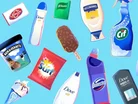Unilever Growth ‘Driven by Innovation & Investment’

- Underlying sales growth (USG): 4.1%, with volumes up 2.6%
- Power Brands account for 75% of turnover. These include include Lynx, Ben & Jerry's, Dove, Hellmann's, Knorr, Lifebuoy, Lux, and Magnum
- Turnover up by 2.3%, to €31.1bn (US$33.7bn)
- Separation of Ice Cream division “on track”
Unilever’s results for the first half of 2024 show “innovation and brand investment driving faster volume growth”, according to the company.
Unilever's Power Brands strategy is part of its Growth Action Plan, which focuses on high-performing, profitable brands with strong consumer recognition.
These include Lynx, Ben & Jerry's, Dove, Hellmann's, Knorr, Magnum, Persil, and Wall's.
Unilever's Growth Action Plan focuses on faster growth through Power Brands, increased productivity and simplicity and fostering a stronger performance culture to improve overall competitiveness and financial results.
CEO Hein Schumacher says: “We are focused on driving high-quality sales growth and gross margin expansion, led by our Power Brands. Over the first half, we made progress on those ambitions.”
A comprehensive productivity programme, alongside the separation of the company’s Ice Cream division, have also been highlighted by Schumacher as key strategies.
Unilever growth and performance
Schumacher added: “Underlying sales grew 4.1%, driven by a third consecutive quarter of positive, improving volume growth, while pricing continued to moderate in line with our expectations.
“We expect underlying sales growth for 2024 to be between 3% to 5%, with growth driven by volume.”
Despite challenges in some markets, including Indonesia and China, Unilever showed resilience, particularly in North America and parts of Europe, while implementing its Growth Action Plan.
Unilever’s profitability and strategic initiatives
Schumacher added: “We continue to embed the Growth Action Plan, by doing fewer things, better and with greater impact. The implementation of a comprehensive productivity programme and the separation of Ice Cream are key to delivering on that commitment and we are progressing at pace.”
Unilever's separation of its Ice Cream division also aims to create a standalone, world-leading business, simplifying Unilever's operations and enhancing focus on core segments.
The separation, expected by 2025, will allow tailored growth strategies for both entities.
The company says that they launched the separation of Ice Cream and the launch of a major productivity programme to “strengthen the company and substantially improve our efficiency and effectiveness.”
In 2023, Unilever’s ice cream brands delivered a turnover of €7.9bn (US$9.8bn), yet the company announced plans to sell off the Ice Cream business in a bid to “refocus” its operations.
Ice Cream, the company says, has “a very different operating model” and that its sale “best serves the future growth of both Ice Cream and Unilever”.
In all, Ice Cream has five of the top 10 selling global ice cream brands.
Schumacher concludes: “There is much to do, but we remain focused on transforming Unilever into a consistently higher performing business.”
--------------
Make sure you check out the latest news at Food Digital, a BizClik brand.




